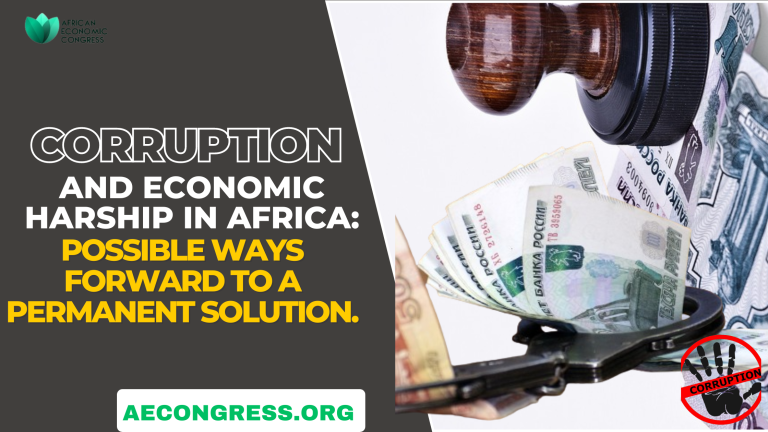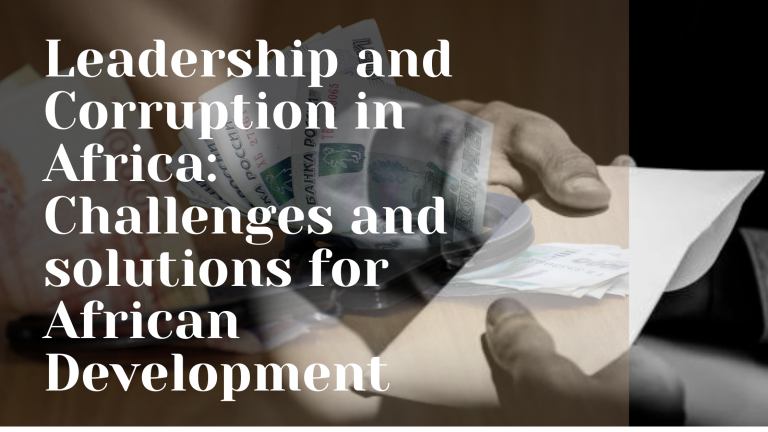Corruption and economic difficulties are two significant challenges that are disturbing African development. These challenges are two interconnected factors that are significantly affecting African development. However, these problems were initiated due to poor leadership style, inequality in treatment, and other relevant factors. This blog post will look at the root of the issues and their possible solutions.
What are the roots of the problems?
- Colonialism: History shows that African colonialism left most African countries with a fragile political system that lacked good structure. African colonialists left Africa with a political system that didn’t favor development. This is the root of African corruption.
- Weak Institutions: Most African countries are struggling with weak and poor institutional structures that lack transparency and accountability in providing a good system of government. This allows corruption to disturb the system of government and promotes poor economic growth and development in those countries.
- Unstable political system: The political system in Africa is still not stable and is struggling with the fear of coups from military officers due to the lack of a good structure to govern people. The political system of most African countries lacks the structure to produce good government for the people. The tradition of frequent changes in government, political conflicts, and lack of continuity in policies promotes economic hardship and political instability in various African countries.
- Limited access to education and awareness: Limited access to education and information to the people has a significant contribution in promoting corruption and economic instability in African countries. People are not well equipped with a good knowledge of societal norms and values, and they are not well aware of the process of managing public offices and resources. This plays a significant role in promoting corruption in Africa and leads to adequate economic instability in Africa.
Possible Ways Forward
- Strengthening Institutions: Providing a well and strong institutional structure will play a vital role in stopping corruption in Africa and it will improve the economic strength of African Nations. Building institutions that are well equipped with good administrative policies, transparent and accountable to the rule of law will help in eradicating corruption and improving the economic stability of Africa. This can be achieved through comprehensive reforms that promote good government, the rule of law, and effective public administration.
- Promoting Education and Awareness: Education is key to every success, equipping people with the knowledge of their norms and values, knowledge of skills based on the institutional needs and educating people about the effects of corruption will help in eradicating corruption and economic hardship in Africa. African countries should design a curriculum that will favor industrial needs and societal norms to encounter corruption and economic hardship in their various countries. Governments and NGOs should invest in educational programs that raise awareness about the dangers of corruption and the importance of civic engagement.
- Promoting Economic Diversification: Diversification of the economy will efficiently help in improving the economic status of Africa. Most African countries rely on one or few resources as the source of their economic development, resources such as petroleum and agriculture. African countries are blessed with good and available human and natural resources, therefore investing in various areas of economic sources such as ICT, renewable energy and human investment will help in eradicating massive economic instability in Africa.
- Encouraging Cooperation among Regions: Promoting strong cooperation among African countries is one of the key factors that will reduce corruption and economic hardship in Africa. Improving the strength of unions such as the African Union (AU), the Economic Community of West Africa (ECOWAS) and other unions in Africa will enhance the eradication of corruption and economic instability in Africa by sharing effort and energy among the countries. By working together, countries can share best practices, coordinate anti-corruption efforts, and create a more conducive environment for economic growth.
- Adapting Technology: Technology can be a game-changer in fighting against corruption and economic hardship in Africa. Adopting digital tools will promote the centralization of government activities through e-government and will also encourage transparency and accountability among public institutions. These will discourage corruption and improve the economic standard of African countries.
- Empowering Civil Society: Civil society organizations (CSOs) play a vital role in promoting accountability and transparency in governance. Therefore, encouraging and supporting CSOs through funding, capacity building, and an enabling environment for their operations can enhance their effectiveness in combating corruption and promoting economic development in Africa.
To tackle the problem of corruption and economic hardship in Africa, it requires multiple efforts. To address these problems, African countries must encourage unity among countries, promote the strength of anti-corrupt agencies, enhance the quality of educational institutions and focus on sustainable solutions to their economic challenges. These efforts in combination with the commitment and determination of African leaders and citizens, can provide a brighter future for Africa.


